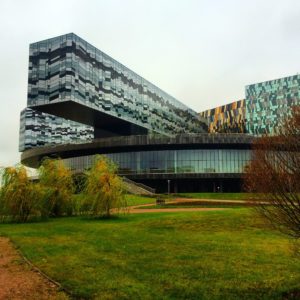Note: I served as Associate Director and Director of the WCC at NES from 2013 to 2022 and have moved onto a new position. However, the WCC at NES remains one of the signature accomplishments of my career, and I preserve this page here to help continue raising awareness about this remarkable institution, which is continuing to survive in spite of enormous obstacles in today’s Russia.
History

The Writing and Communication Center (WCC) was founded at the New Economic School (NES) in September 2011 in connection with the launch of the joint Higher School of Economics (HSE) and NES Bachelor of Arts in Economics (BAE) program. With its emphasis on the development of students’ communication skills and critical thinking, the BAE program was the first to benefit from the WCC services as early as September 2011.
The WCC was conceived as a free and voluntary academic support service for NES students wishing to become stronger writers and speakers in both English and Russian and for NES faculty wishing to integrate written and oral communication into their courses. These two branches constitute our priority in allocating resources.
In the course of its development, the WCC has begun helping faculty who wish to enhance the quality of their written and oral academic communication. Also, in response to the growing interest in academic writing skills and composition pedagogy from colleagues across universities, the WCC has made outreach efforts.
Currently the WCC offers services to NES students in all academic programs as well as to alumni, staff and faculty.
Mission
We believe that effective communication is a key to academic and professional success, cultural awareness and personal growth. The vision of the Center we would like to inculcate in the NES community is that of a place where both beginning and advanced writers and speakers can grow, not a “fix-it-shop” where “weak” students go to correct papers. Following the prevalent principles of writing center pedagogy, the WCC at NES concentrates on the strengths and needs of each learner as evident in her work, so she can have a long-term learning advantage rather than a mere editorial service. As prominent scholar in writing pedagogy Stephen M. North has famously put it:
Our job is to produce better writers, not better writing. Any given project—a class assignment, a law school application letter, an encyclopedia entry, a dissertation proposal—is for the writer the prime, often the exclusive concern. That particular text, its success or failure, is what brings them to talk to us in the first place. In the center, though, we look beyond or through that particular project, that particular text, and see it as an occasion for addressing our primary concern, the process by which it is produced. (“The Idea of a Writing Center”)
In their work, WCC consultants employ the Socratic method of thought-provoking questions to promote critical thinking and to help students become independent, empowered writers and speakers with distinct voices.
In academic settings, writing and communication practices are essential instruments for initiating and conducting critical inquiry. We are happy to create professional enrichment opportunities for faculty from and outside of NES who are interested in learning principles of writing and communication pedagogy to be used across disciplines.
Reports and Publications
2019-2020 Annual Report (in English/на русском).
“The Case for Student Oriented Writing Centers in Russia,” Вышее образование в России/Higher Education in Russia 12.8 (Fall 2016): 66-73.
“Writing Centers and Academic Professionalization in the Russian Federation.” Western Higher Education in Global Contexts. Edited by Mohanalakshmi Rajakumar, pp. 1-22. Lexington Books: 2018.
“Who Uses the Writing Center? An Analysis of Visitors from the NES-HSE Joint Bachelor’s Program, 2013-2018.” Higher Education in Russia and Beyond 2.16 (Summer 2018): 7-10.
(Editor). Emerging Writing Research from the Russian Federation. WAC Clearinghouse, University Press of Colorado. In press, forthcoming 2021.
“A Transnational Training Model for Peer Tutors: Authority, Rhetorical Awareness, and Language in/through Virtual Exchange Practices.” With Olga Aksakalova. In Emerging Writing Research from the Russian Federation, edited by L. Ashley Squires. Forthcoming from WAC Clearinghouse, 2021.
“Introduction.” In Emerging Writing Research from the Russian Federation, edited by L. AshleySquires. Forthcoming from WAC Clearinghouse, 2021.